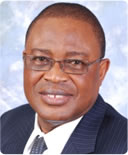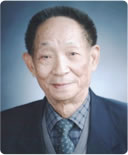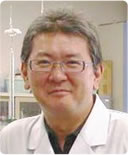|
Laureates
About Winners
Main Prize/Dr. Monty Patrick Jones
Executive Director of Forum for Agricultural Research in Africa , Sierra Leone

Dr. Jones was born in Sierra Leone, 1951. Executive director of Forum for Agricultural Research in Africa(FARA).�He obtained a B.Sc. in Agriculture at Njala University in 1974, followed by an M.Sc. in Plant Genetic Resources (1979) and a Ph.D. in Plant Biology (1983) at the University of Birmingham, UK.
Dr. Jones had started his career in the 1975 at National Rice Research Station (RRS). After working at The International Institute of Tropical Agriculture (IITA) in 1988, he began to work at West Africa Rice Development Association (WARDA, Now Africa Rice Center) in 1991, there he led NERICA project team. From 2002 when established FARA, he began working as incumbent.
Dr. Jones specializes in leadership in African agricultural research and instruction and forging functional partnerships and strategic alliances for agriculture in Africa.
Executive Board of the African Green revolution (AGRA), Chairperson of the Global Forum for Agricultural Research (GFAR), Co-chairperson of the Coalition for African Rice Development (CARD) etc. Member of The Academy of Sciences for the Developing World (TWAS), Co-winner of the 2004 World Food Prize.
His great leadership ability is widely acknowledged in various fields.

Dr. Monty Jones of Sierra Leone, Africa, contributed to various rice research projects of West Africa Rice Development Association ( WARDA ) from 1991 to 2002. Among these projects, his outstanding achievement was the development of NERICA rice that was called "Miracle Rice" because he developed it with the best use of biotechnology by crossing African rice and Asian rice which was said very difficult.
Rice farming in Africa is mainly on the dry land or the limited area where is blessed with rain. For this type of farming environment, they have to use African rice which tolerate to dryness and weeds but the weak point of the rice is low crop, so the crop is not enough to feed the population of the area that forced them to import the rice.
NERICA ( NEw RIce for afriCA) changed the situation dramatically. NERICA has both good characters of African and Asian rice that is African tolerance to the severe environment and quick growing with Asian high productivity.
The birth of NERICA that has the supreme potential to improve the productivity of African farmers gathered the international attention and it spread to other countries.
Today, farming test is held in more than 30 countries and more than 250 thousands hectares are cultivated for NERICA in Guinea, Nigeria, Cote d'Ivoir, Benin, Rwanda, Uganda after the year 2003.
NERICA has not only improved the income of African farmers but also to stabilized the economics of the countries by reducing the outflow of foreign currency to import rice.
Dr. Jones who is the secretary general of "Forum for Agricultural Research in Africa" ( FARA ) try to make the produtct of NERICA in Africa double in 10 years with the cooperation of governments, private corporations and the developing organizations of United Nations. He also led the FARA project of " Framework for African Agricultural Productivity"(FAAP) which confirmed by African governments in 2006.
He is the chairperson of "Global Forum on Agricultural Research" and also his activities in the field of various international projects including "Green Revolution of Africa" cover very large part of the food improving movement in Africa.
Dr. Jones was selected as the one of " The most influential 100 persons in the world" in 2007 by Time magazine.
Sano Touzaburo Special Prize/Prof.Yuan Longping
Chief Researcher of China National Hybrid Rice Research & Dev. Center, China

Born in Beijing on 7th of Sept. 1930. The chief of China National Hybrid Rice Research & Development Center, and Senior Plant Breeder of Hunan Academy of Agricultural Sciences. After graduation of South West Agricultural University in 1954. He worked at Ankiang Agricultural School as the teacher of Plant Genetic Seed Breeding and started his research on Hybrid rice in '64.
In '76 he first released the hybrid seed for commercial hybrid production in china. And the fact brought him the honorific title of "the Father of Hybrid Rice."
He played the main role in Chinese National Project called "Super Rice Plan" that started in '96 and now the plan came to the third stage objective and it would be cleared.
He is the Professor of Hunan Agricultural University, Qinghua University, Wuhan University and Emeritus of Hong Kong University.
In 2006, he also is selected as the first Foreign associate of The National Academy of Sciences (NAS) in the field of Agriculture in China. And He was awarded 21 prizes after 1981 such as : France's Top Rank Agricultural Meritorious Medal, French Government, Beijing, French Embassy in China, 2010. Lifetime Achievement Award, YOU BRING CHARM TO THE WORLD AWARD CEREMONY, Beijing, China, 2008. Outstanding Achievement Award, ASPA, 2005. World Food Prize, World Food Prize Foundation, Des Moines, USA, 2004. Wolf Prize, Wolf Foundation, Jerusalem, Israel, 2004. Golden Sickle Award, Bangkok, Thailand, 2004. Etc.

Prof. Yuan LongPing is the founder of the hybrid rice research in China and the international prince of the breeder of hybrid rice by using heterosis. Some praised that the development of hybrid rice would be equal to the Chinese Four Great Inventions.
The hybrid rice that developed by Prof. Yuan improved "the world food problem" that is caused by the increasing population and the decreasing farming land by the desertification or urbanization.
In early 1960s, Prof. Yuan began to think that the rice is the only answer to save the many Chinese persons who are suffering from starvation. In such days he found the rich grown rice than usual and later he noticed that the rice is the hybrid vigor (hetrosis).
That was his start of the hybrid rice research. He began his quest of hybrid rice in 1964. After nine years of hard work, he successfully developed the hybrid rice in 1973. This hybrid rice has 20% more yield than elite inbreed varieties, it's planting area increased rapidly year after year.
Prof. Yuan was not satisfied with his past success. He kept on his exploration. In 1987, he was elected the principal investigator, leading national key project of hybrid rice.
After many failed trials, he developed a comprehensive array of theory and techniques and finally succeeded in 1995. It has been proven that this new type hybrid yields 5-10% more than the older type hybrid. The grain quality is also improved. To secure grain supply, many countries have started super rice research since 1980s. Japan was the first to initiate such project and then The Chinese Ministry of Agriculture initiated super rice breeding program in 1996. This program had two stage goals. The first stage super rice breeding program in 1996. This program had two stage goals. The first stage was implemented during 1996-2000, with the goal to increase rice yield from 8.5 t/ha to 10.5 t/ha. The second stage was implemented during 2001-2005, with a goal to increase to 12 t/ha.
Prof. Yuan assumed the responsibility to develop super hybrid rice. Based on his rich experience, solid knowledge and the understanding of new situation in international rice research, he laid out a road map. Under the guidance of this road map, his team has fulfilled the first and second stage yield goals in the year 2000 and 2004 respectively.
Currently, his team is charged to reach the 13.5 t/ha landmark of the third stage super hybrid rice and the team is expected to accomplish the objectives by 2012.
In recent years, the area under hybrid rice has account for 65% of Chinese total rice output. As such, the increased output can feed additional 70 million people.
Organized by FAO&IRRI, many hybrid rice workshops and training courses have been offered and more than 2000 people received training.
In the year 2007, hybrid rice was grown in India, Vietnam, Philippines, Bangladesh, Indonesia, Pakistan, Egypt and USA to improve their food supply. This will be a significant contribution to the security of food supply and world peace.
21st Century Hope Prize /Dr. Fumihiro Fujimori
Associate Professor of Tokyo Kasei University Domestic Science Dept. Environmental Education Course, Japan

Born: 1965. In 1990, Graduate Agriculture Major, College of Agriculture and Veterinary Medicine, (Now the college is called "Bio-resource Science"), Nihon University. In 1992, Agricultural Master, Agriculture Research Course, Graduate School of Nihon University. After graduate school, worked at "Roche Japan Inc." "RIKEN Research." And "Tokyo University of Science." In April of 2004, inducted as the Associate Professor of Environmental Information Course, Domestic Science Dept. Tokyo Kasei University. Now, he is the Associate Professor of Biotechnology Study, Environmental Education Course, (The course name is changed from "Environmental Information to Environmental Education.), Domestic Science Dept. Tokyo Kasei University.
Dedicated to research on fungus such as "gene analysis of fungus" and "developing the anticancer effect of the secondary product which originated from fungus."
He got the doctor's degree in 2001 when he worked at Tokyo University of Science as the lecturer. Wrote many papers and books. Recent book is "Introduction for Indoor Environmental Study."(Edited by Society of Indoor Environment)
Member of "The Molecular Biology of Japan" and "Japan Society for Bioscience, Biotechnology, and Agrochemistry."
His hobby is to grow roses. He said "the scent of Senteur Royale is the best!"
His principle is "Make my way not by Hope but by Wish."
He lives in Funabashi City, Chiba Prefecture, Japan.

Dr.Fumihiro Fujimori, the associate professor of Tokyo Kasei University is the specialist of the genome science.
He developed the large-scale database of the mushroom genetic code (cDNA) in cooperation with "Yukiguni Maitake Corp."(mushroom company, Japan) and "HyphaGenesis Corp"(Japan).
Because they used traditional technique and the experience of trial and error to breed the types of mushroom so far, there is no scientific verification to apply to industrial and medical use of them and that has caused the delay of development in this area.
The development of "the genetic code database of mushroom" will create the new progress in this field.
It takes more than several years to develop the new types of mushrooms of better taste, but with the Database, by specifying the genetic code, they not only shorten the growing term and increase the productivity but also to make it possible to develop the precious kind like truffe artificially.
They say some ingredient of mushroom has effect to suffocate the growth of cancer cell but there is no scientific resolution to prove it yet. Also, the Database is very useful to specify the medicinal effect of mushroom to cancer.
There is the possibility that the Database is utilized in other medical field.
The structure called "Lipid raft" which is the part of human cell membrane is thought as the entrance of various viruses into the body. Dr. Fujimori in cooperation with RIKEN Research (Japan) discovered the gene of mushroom that combines specifically to Lipid raft of human body and it would be the new possibility to prevent the invasion of virus. Like these examples, the Database that was developed by Dr. Fujimori will contribute as the firm basis for the research of various fields.
Our Sincere Gratitude and the Will for Tomorrow
Hajime Koizumi / Chairman of the Board of Directors
It had taken more than a year to establish the foundation that specialized to award the persons or the groups in the field of international foods. For this period, with the strong assistance and the generous cooperation of many people, we could carry out our task of determining first winners after the intense and sincere screening.
We took the first step to realize our wish to contribute to the region and the world by making Niigata as the international stronghold of the food information.
We want to share the wisdom and the knowledge of the winners with all of you and it will be our responsibility to try to enrich this project for the next step.
We express our sincere gratitude and the firm will for the future.

Selection of candidates for the Niigata International Food Award winners
Hideaki karaki, PhD / Chairman of the Selection Committee

I am very pleased to announce that, in response to our call for the nominees, there were unexpectedly large number, total of 15 applications from 95 countries all over the world.
As a general rule, only one winner will be selected for each of the Main Prize, The Sano Touzaburo Special Prize and The 21st Century Hope Prize. The Selection Committee members tried their best to select the most appropriate candidates by reviewing the documents and also by serious discussion.
For the Main Prize, document review was conducted by the Selection Committee for the evaluation of total of forty four candidate recommended from around the world. We also had a face-to-face discussion and suggested to the board those candidate who put a high score ranking.
For the Sano Touzaburo Special Prize, there were sixteen candidates recommended from around the world. We made the similar selection and suggested to the board those candidate who put a high score ranking.
For the 21st Century Hope Prize, there were eighteen candidates all from Japan. We made the similar selection and suggested to the board those candidate who put a high score ranking.
The final winners for these prizes will be decided by the council based on the suggestion from the Selection Committee.
I would like to express my sincere thank to those who kindly made recommendations for excellent candidates, and also to the member of the Selection Committee for their effort.

Screening Committee
| Hideaki Karaki |
Vice President of the Science Council of Japan |
| Shuichi Kimura |
Specially Appointed Professor Showa Women's University |
| Shinichi Shougenji |
Dean of Agriculture Depart. Tokyo University |
| Takashi Inoguchi |
President of Niigata Prefectural University |
| Ikuo Hirayama |
President of Niigata University of International and Information Studies |
| Kanji Yamaguchi |
Special Adviser, Okuno & Partners |
| Akio Shibata |
President, Marubeni Research Institute |
| Akio Yamanoi |
Adviser, Ajinomoto Co., Inc. |
| Goro Koide |
Former President of the Japanese Association of Science & Technology Journalists |
| Masayoshi Konno |
President of Nihon Shokuryo Shinbun (Japan Food News) |
| Hiroshi Matsubara |
President of Japan Agricultural News |
|
